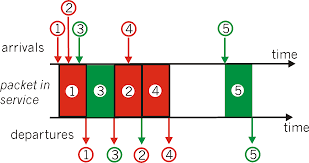Round Robin Scheduling
|
- One of the oldest, simplest, fairest and most widely used
algorithm is round robin (RR).
- In the round robin scheduling, processes are dispatched in a
FIFO manner but are given a limited amount of CPU time called a time-slice or
a quantum.
- If a process does not complete before its CPU-time expires, the
CPU is preempted and given to the next process waiting in a queue. The
preempted process is then placed at the back of the ready list.

- Round Robin Scheduling is preemptive (at the end of time-slice)
therefore it is effective in time-sharing environments in which the system
needs to guarantee reasonable response times for interactive users.
- The only interesting issue with round robin scheme is the length
of the quantum. Setting the quantum too short causes too many context
switches and lower the CPU efficiency. On the other hand, setting the quantum
too long may cause poor response time and appoximates FCFS.
- In any event, the average waiting time under round robin
scheduling is often quite long.
|
First-Come-First-Served (FCFS) Scheduling
|
Other names of this algorithm are:
- First-In-First-Out (FIFO)
- Run-to-Completion
- Run-Until-Done
- Perhaps, First-Come-First-Served algorithm is the simplest
scheduling algorithm is the simplest scheduling algorithm. Processes are
dispatched according to their arrival time on the ready queue. Being a
nonpreemptive discipline, once a process has a CPU, it runs to completion.
The FCFS scheduling is fair in the formal sense or human sense of fairness
but it is unfair in the sense that long jobs make short jobs wait and
unimportant jobs make important jobs wait.
- FCFS is more predictable than most of other schemes since it
offers time. FCFS scheme is not useful in scheduling interactive users
because it cannot guarantee good response time. The code for FCFS
scheduling is simple to write and understand. One of the major drawback
of this scheme is that the average time is often quite long.
- The First-Come-First-Served algorithm is rarely used as a master
scheme in modern operating systems but it is often embedded within other
schemes.
|

No comments:
Post a Comment